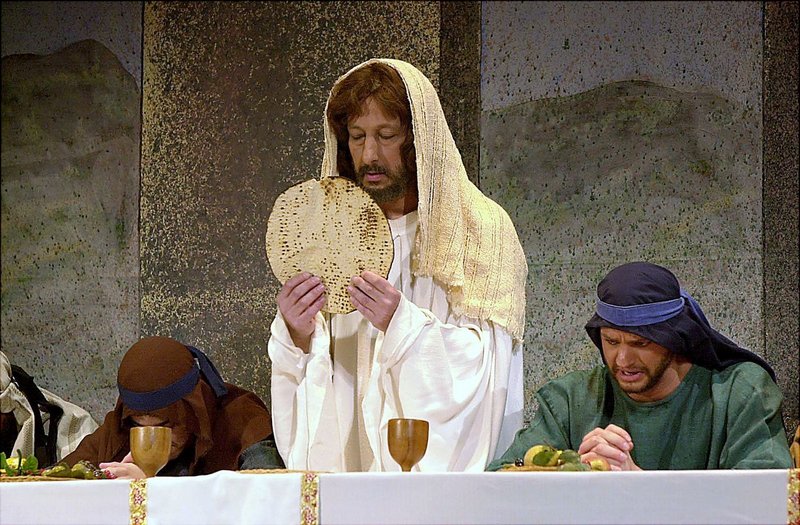The Last Supper was probably the next-to-last supper of Jesus’ life, a British researcher has concluded after using ancient calendars and astronomical data to rethink the chronology of what Christians know as Holy Week.
Colin Humphreys, a scientist who previously explored the Exodus of the Old Testament, believes his studies show that Holy Thursday — the day that Jesus gathered his disciples for the famous supper, according to tradition — was actually a Wednesday.
Humphreys also believes he has resolved a longstanding disagreement over whether the Last Supper was a Jewish Passover Seder: It was, he says.
Humphreys’ book, “The Mystery of the Last Supper,” was published by the Cambridge University Press on Thursday, a day that many Christians observed as one of the holiest of the year. That’s a mistake, according to the researcher, a professor of materials science at Cambridge who has made a sideline of biblical research.
“The Last Supper was on Wednesday, April 1, A.D. 33, with the crucifixion on Friday, April 3, A.D. 33,” Humphreys writes. He believes that his research not only definitively establishes the dates, which have eluded most scholars, but that it resolves an apparent conflict within the Gospel accounts of Jesus’ last days.
With his book, Humphreys wades into a murky, centuries-old debate over the chronology of Jesus’ last days. Among others who have weighed in recently is Pope Benedict XVI, whose book “Jesus of Nazareth: Part Two” considered the evidence that the Last Supper might have been held earlier in the week. He said it seemed unlikely.
The Gospels of the New Testament are in agreement that Jesus held a Last Supper, was tried and convicted, was crucified on a Friday and arose on Sunday.
There is, however, a problem of consistency: According to the Gospel of John, the crucifixion took place as Jews were preparing for the first night of Passover, the feast that celebrates the freedom from bondage in Egypt. But the so-called synoptic gospels of Matthew, Luke and Mark describe the Last Supper as a Passover meal.
Some scholars and theologians have concluded that John was being metaphorical, because by his chronology, Jesus was killed at precisely the moment that Jews were sacrificing paschal lambs for the Passover meal. Jesus, of course, is known as the “lamb of God.”
CALENDAR CONFUSION
In 1953, a French researcher, Annie Jaubert, concluded that the official Passover indeed began Friday night, but that Jesus was probably relying on an ancient priestly calendar that had the holiday beginning on Tuesday evening. In other words, the Gospels were in agreement — Passover began Friday night, but Jesus had already celebrated it.
In his Holy Thursday homily in 2007, Pope Benedict XVI seemed to tentatively endorse that view, but he ultimately rejected it in his book this year.
Instead, he said Jesus was celebrating “his Passover” because he knew he would die before the actual holiday. “And in this sense he both did and did not celebrate the Passover,” the pope wrote.
Humphreys believes that both Jaubert and Benedict were on the right track, but ultimately wrong.
To draw his conclusions, he delved into an even older calendar, one that Hebrew people had been using since 3000 B.C. and had largely — but not entirely — abandoned by the time Jesus was alive.
He employed an astrophysicist, Graeme Waddington of Oxford University, to help calculate what that calendar would have looked like around the time of Jesus’ death.
What he found, Humphreys said, was that Passover would have begun on Wednesday evening in A.D. 33. For a variety of reasons, he believes Jesus used that calendar.
In the same vein as Jaubert’s conclusion, that would mean all the Gospel writers were correct.
“I was surprised by just how well the Gospels agree,” Humphreys said in a telephone interview Thursday. “You can just dovetail them together remarkably.”
Humphreys said he believes that Jesus probably was in jail on Thursday and that his actual “last supper” was prison fare. “I don’t think he would have had much of a last supper,” he said.
SCIENCE AND THE BIBLE
Humphreys’ book is likely to create a stir among biblical scholars, whether or not it alters prevailing views.
“I think it’s really fascinating the way he brings in astronomy and ancient calendars and other contributions from outside the field of biblical studies,” said Paul Anderson, a professor of biblical studies at George Fox University, a Quaker school in Newberg, Ore. Anderson previewed Humphreys’ book before publication.
However, he said, “scholars won’t agree with many of his presuppositions.”
But Humphreys said he has received mostly warm reviews from Bible scholars, even if they don’t “agree with every word.”
And, as a scientist and Christian, he said he hopes his efforts will contribute to the dialogue between science and religion.
“I’ve used science and the Bible hand in hand here,” he said. “It’s a nice example, I think, of science and the Bible working together.”
Send questions/comments to the editors.




Success. Please wait for the page to reload. If the page does not reload within 5 seconds, please refresh the page.
Enter your email and password to access comments.
Hi, to comment on stories you must . This profile is in addition to your subscription and website login.
Already have a commenting profile? .
Invalid username/password.
Please check your email to confirm and complete your registration.
Only subscribers are eligible to post comments. Please subscribe or login first for digital access. Here’s why.
Use the form below to reset your password. When you've submitted your account email, we will send an email with a reset code.